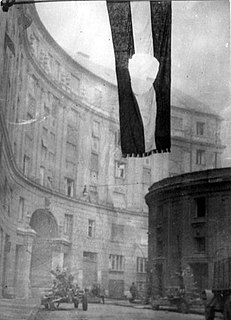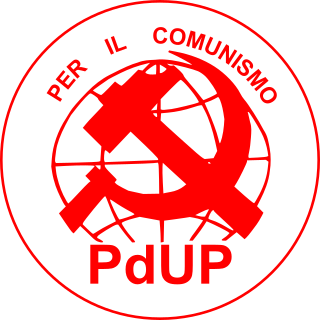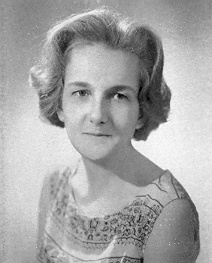
Enrico Berlinguer was an Italian politician, considered the most popular leader of the Italian Communist Party (PCI), which he led as the national secretary from 1972 until his death during a tense period in Italy's history, marked by the Years of Lead and social conflicts such as the Hot Autumn of 1969–1970.

The Italian Communist Party was a communist political party in Italy.

The Hungarian Revolution of 1956, was a countrywide revolution against the Stalinist government of the Hungarian People's Republic (1949–1989) and the Hungarian domestic policies imposed by the USSR. Initially anarchic, the Hungarian Uprising was the first major nationalist challenge to Soviet Union's control of Hungary since the Red Army ended the Nazi occupation of Hungary at the end of the Second World War in Europe, in May 1945.

Palmiro Michele Nicola Togliatti was an Italian politician and leader of the Italian Communist Party from 1927 until his death. He was nicknamed Il Migliore by his supporters. In 1930 he became a citizen of the Soviet Union and later he had a city in that country named after him: Tolyatti.

Luigi Longo, also known as Gallo, was an Italian communist politician and secretary of the Italian Communist Party from 1964 to 1972. He was also the first foreigner to be awarded an Order of Lenin.

The Sammarinese Communist Party was a Marxist political party in the small European republic of San Marino. It was founded in 1921 as a section of the Communist Party of Italy (PCI). The organization existed for its first two decades as an underground political organization.

The Italian Socialist Party was a socialist and later social-democratic political party in Italy, whose history stretched for longer than a century, making it one of the longest-living parties of the country.

The 1948 Italian general election was held in Italy on Sunday 18 April 1948 to elect the first Parliament of the Italian Republic. The elections were characterised by campaign financial and propaganda efforts conducted by the United States and Great Britain on behalf of the coalition led by the Christian Democracy party. The Soviet Union intervened by closely controlling the Communist Party of Italy, which led a coalition of its own.
Lucio Colletti was an Italian Western Marxist philosopher. Colletti started to be known outside Italy because of a long interview that Marxist historian Perry Anderson published in the New Left Review in 1974.

The Fasci Siciliani[ˈfaʃʃi sitʃiˈljani], short for Fasci Siciliani dei Lavoratori, were a popular movement of democratic and socialist inspiration, which arose in Sicily in the years between 1889 and 1894. The Fasci gained the support of the poorest and most exploited classes of the island by channeling their frustration and discontent into a coherent programme based on the establishment of new rights. Consisting of a jumble of traditionalist sentiment, religiosity, and socialist consciousness, the movement reached its apex in the summer of 1893, when new conditions were presented to the landowners and mine owners of Sicily concerning the renewal of sharecropping and rental contracts.

The Proletarian Unity Party was a Socialist political party in Italy.

Antonio Giolitti was an Italian politician and cabinet member. He was the grandson of Giovanni Giolitti, the well-known liberal statesman of the pre-fascist period who served as Prime Minister of Italy five times.

Rossana Rossanda was an Italian communist politician, journalist, and feminist.
The following events occurred in October 1956:
The Central Intelligence Agency (CIA) has been involved in Italian politics since the end of World War II. The CIA swung the 1948 general election in favor of the right-wing Christian Democrats and would continue to intervene in Italian politics until at least the early 1960s.

Lucio Magri was an Italian journalist and politician.

Eurocommunism, also referred to as democratic communism or neocommunism, was a trend in the 1970s and 1980s within various Western European communist parties which said they had developed a theory and practice of social transformation more relevant for Western Europe. During the Cold War, they sought to reject the influence of the Soviet Union and the Communist Party of the Soviet Union. The trend was especially prominent in Italy, Spain, and France.
The anti-Stalinist left is an umbrella term for various kinds of left-wing political movements that opposed Joseph Stalin, Stalinism and the actual system of governance Stalin implemented as leader of the Soviet Union between 1927–1953. This term also refers to the high ranking political figures and governmental programs that opposed Joseph Stalin and his form of communism, like Leon Trotsky and other left wing traditional Marxists.
Events from the year 1921 in Italy.

Bolshevization was the process starting in the mid-1920s by which the pluralistic Comintern and its constituent communist parties were increasingly subject to pressure by the Kremlin in Moscow to follow Marxism–Leninism. The Comintern became a tool of soviet foreign policy. That policy downplayed autonomy in favor of support for the Soviet Union and its foreign policy.














